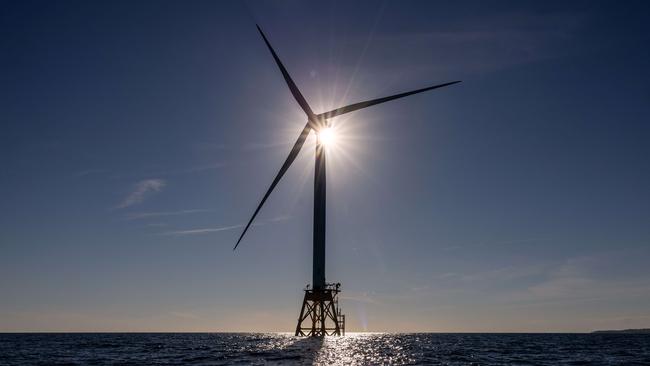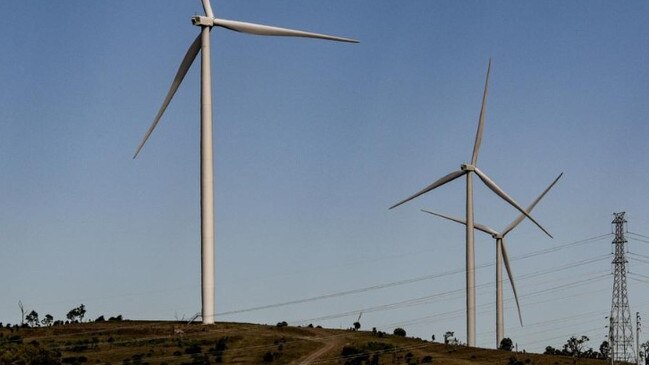
Fresh from her visit to the White House with prime minister Anthony Albanese, Macquarie boss Shemara Wikramanayake delivered a rare earnings miss.

Indeed, the first-half profit was down 39 per cent on the year to $1.4bn, hobbled by surging staff costs, softer revenue and writebacks. The profit collapse makes Macquarie more like a sleepy big four bank rather than a global cash machine commanding a sharp share premium.
One of Macquarie’s core businesses - the buying and selling big infrastructure and energy assets has ground to a halt, given the slowdown in dealmaking globally as markets globally hobbled by the prospect of higher for longer interest rates. The uncertainty on global outlook and higher financing costs has kept buyers away, leading to more assets sitting on the books than what it would normally want.
And green energy, an area where Wikramanayake has staked ground as an early mover by driving big bets on offshore windfarms and solar projects around the world, is delivering a new problem for the bank.
The economics of renewables is starting to become deeply challenged and this is having a dramatic impact on the value of projects springing up around the world.
As more renewables flood the grid it is becoming clear they produce much of their electricity, usually at a time when it is not needed. This is seeing the unit pricing for green electricity projects collapse, particularly in Europe, although the cost of building remains sky high.
Headwinds
In recent weeks oil major BP has written more than $US540m from two US offshore wind projects with inflation-linked construction costs soaring but offtake pricing collapsing. The cost of wholesale pricing on offer in the UK has come down 65 per cent in a short space of time, leaving few willing buyers to commit capital for new projects.
Macquarie has some $2.1bn of green energy investments underway with two-thirds of this at development stage which also means it is exposed to construction risk. Most of the funds are allocated to offshore wind and the rest is mixed between solar and small allocation to battery.
Wikramanayake acknowledges there is some concern about the direction of the green energy book given where unit pricing is going. She says Macquarie has taken a conservative view on projects and much of its offtake agreements underpinning projects were pitched pre-Covid when prices were higher.

Speaking to The Weekend Australian, Wikramanayake is still a believer in green energy with the longer term thematics stronger than ever. There’s still massive demand among governments and other operators to move out of carbon producing coal into green energy. The UK government wants 50 gigawatts by 2030 and have so far only hit less than half that. In the US, the Biden administration is targeting 30 gigawatts.
“This journey will not be a straight line like every other journey. But I think the important thing is a structural response needed, and the opportunity remains,” Wikramanayake says.
The recent shake-up in pricing has “given a bit of a wake-up call to people that are putting these off-take (agreements) in place that if they’re going to get the supply, they’re going to need to offer pricing that will attract private capital”.
She is more confident about demand for Macquarie’s green energy and other infrastructure assets in the coming six months, adding the bank is prepared to wait out the downturn.
“Plainly, we don’t want to sell these assets at less than their fair value. We don’t we don’t feel like we need to sell them if we feel like they’re good quality assets.”
Cost surge
Meanwhile, Macquarie’s indigestion is surfacing across other areas, including the furious growth rates the investment bank has undertaken as it expands through the world, with a big focus on the US. Macquarie is now as big as it has ever been, with nearly 21,300 staff around the world. This is up nearly 6000 in five years with much of that growth coming through the uncertainty of Covid.
Wikramanayake says the growth is in part a result of two US acquisitions but also about driving up investment in the growth areas: digitisation, cloud support and retail banking in Australia in particular. Like all other companies, the bank is paying up for top talent, and this is blowing out costs. Expenses to income running at a decade long high of 75 per cent.
Macquarie too is becoming a home for former regulators. Former APRA boss Wayne Byres has now taken up the role of poacher not gamekeeper, joining the board of Macquarie’s banking subsidiary.
Since 2021 Macquarie has been chaired by former Reserve Bank governor Glenn Stevens. A career regulator, Byres retired from APRA 15 months ago.
For its part, Macquarie’s Stevens thinks the market is undervaluing the bigger picture about the investment bank’s potential. And he is spending up to $2bn of Macquarie’s own surplus capital in a share buy back. This helped keep Macquarie’s shares trading higher on Friday, despite the profit miss.






For years Macquarie was seemingly able to defy gravity, but it seems even the investment bank can’t outrun the bigger forces upending green energy markets.